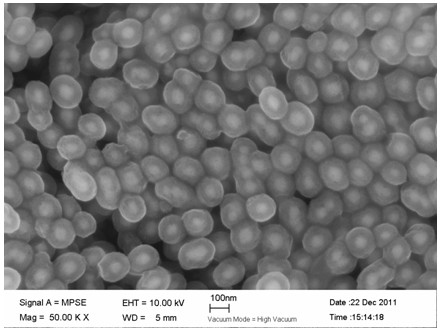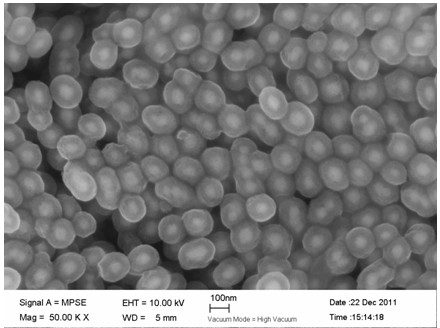Preparation method of silica-coated iron oxide nano-core-shell structural material
A technology of nano-core-shell and structural materials, applied in the direction of nano-structure manufacturing, iron oxide/hydroxide, silicon dioxide, etc., can solve the problems of complex operation process, serious core agglomeration, and difficulty in scale-up production, and achieve the synthesis process Simple, obvious core-shell structure, easy to enlarge the effect of synthesis
- Summary
- Abstract
- Description
- Claims
- Application Information
AI Technical Summary
Problems solved by technology
Method used
Image
Examples
Embodiment 1
[0017] 1. Preparation of iron oxide nanoparticles: Dissolve 1.01g of ferric nitrate, 0.5ml of acetic acid and 5g of polyvinylpyrrolidone in 250ml of ethanol solvent, stir and mix evenly, then transfer the solution into a polytetrafluoroethylene reactor and heat to 200°C for reaction , the stirring speed was 100r / min, and a 6nm iron oxide nanoparticle suspension was obtained after reacting for 3 hours.
[0018] 2. Preparation of core-shell structure: Add 520ml of ethanol, 200ml of deionized water, 0.8g of cetyltrimethylammonium bromide to the suspension of iron oxide nanoparticles, and adjust the pH value to 8 with triethanolamine. Under the condition of stirring, 2.5 g of tetraethyl orthosilicate was slowly added to react for 12 hours, filtered and dried, and calcined at 450° C. to obtain a core-shell structure with a coating layer of 5 nm mesoporous silica.
Embodiment 2
[0020] 1. Preparation of iron oxide nanoparticles: Dissolve 0.5g ferrous chloride, 0.5ml acetic acid and 2.02g polyvinylpyrrolidone in 200ml ethanol solvent, stir and mix evenly, then transfer the liquid into a polytetrafluoroethylene reactor and heat to The reaction was carried out at 180° C., and the stirring speed was 80 r / min. After 48 hours of reaction, a suspension of 12 nm nanometer iron oxide particles was obtained.
[0021] 2. Preparation of core-shell structure: Add 200ml of ethanol and 200ml of deionized water to the above-mentioned iron oxide nanoparticle suspension, adjust the pH value to 9 with ammonia water, and slowly add 2.5g of tetraethyl orthosilicate to react under stirring conditions After 24 hours, filter and dry, and bake at 500°C to obtain a core-shell structure with a coating layer of 6.5nm silicon dioxide.
Embodiment 3
[0023] 1. Preparation of iron oxide nanoparticles: Dissolve 1.01g ferric nitrate, 2ml acetic acid and 0.5g polyvinylpyrrolidone in 100ml ethanol solvent, stir and mix evenly, then transfer the solution into a polytetrafluoroethylene reactor and heat to 160°C for reaction , the stirring speed was 40r / min, and after 24 hours of reaction, a suspension of 60nm cubic iron oxide particles was obtained.
[0024] 2. Preparation of the core-shell structure: Add 320ml of ethanol, 400ml of deionized water, 0.2g of cetyltrimethylammonium bromide to the above iron oxide nanoparticle suspension, adjust the pH value to 10 with ammonia water, and stir Slowly add 0.625g of tetraethyl orthosilicate under the conditions of 72 hours, filter and dry, and bake at 550°C to obtain a core-shell structure with a coating layer of 20nm mesoporous silica.
PUM
 Login to View More
Login to View More Abstract
Description
Claims
Application Information
 Login to View More
Login to View More - R&D
- Intellectual Property
- Life Sciences
- Materials
- Tech Scout
- Unparalleled Data Quality
- Higher Quality Content
- 60% Fewer Hallucinations
Browse by: Latest US Patents, China's latest patents, Technical Efficacy Thesaurus, Application Domain, Technology Topic, Popular Technical Reports.
© 2025 PatSnap. All rights reserved.Legal|Privacy policy|Modern Slavery Act Transparency Statement|Sitemap|About US| Contact US: help@patsnap.com


